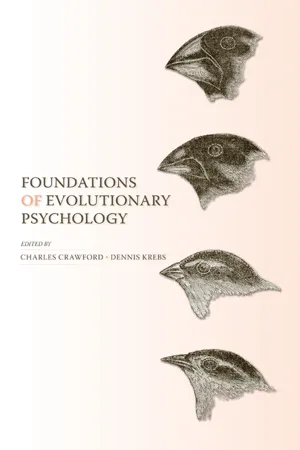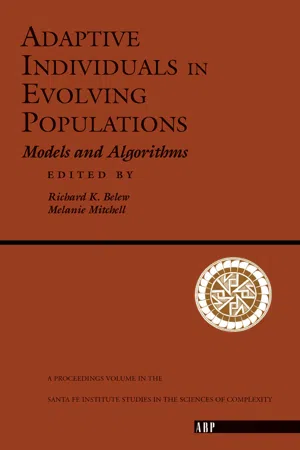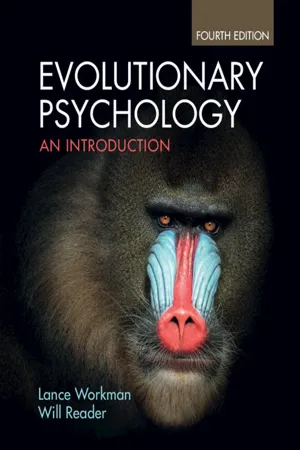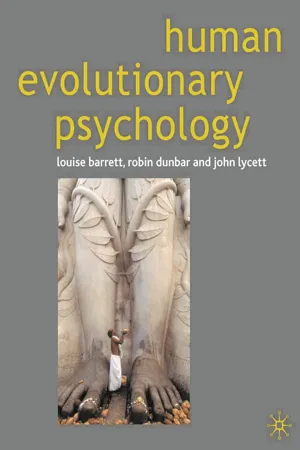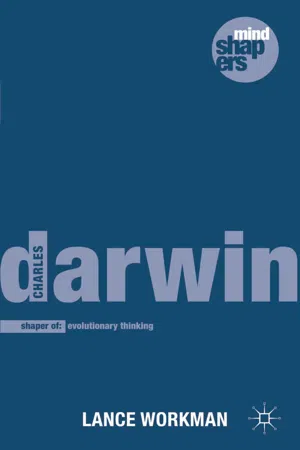Psychology
Evolution and Behavior
Evolution and behavior refers to the study of how evolutionary processes have shaped human and animal behavior. It explores how behaviors have evolved over time to enhance survival and reproductive success. This field examines the influence of genetics, natural selection, and environmental factors on the development of various behaviors.
Written by Perlego with AI-assistance
Related key terms
1 of 5
11 Key excerpts on "Evolution and Behavior"
- eBook - ePub
- Charles Crawford, Dennis Krebs(Authors)
- 2012(Publication Date)
- Psychology Press(Publisher)
1Evolutionary PsychologyThe Historical ContextCATHERINE SALMON AND CHARLES CR AWFORD“In the distant future I see open fields for far more important researchers. Psychology will be based on a new foundation, that of the necessary acquirement of each mental power and capacity by gradation. Light will be thrown on the origin of man and his history.”Charles Darwin, 1859, On the Origin of SpeciesOne such new field is Evolutionary Psychology. This discipline focuses on the study of human behavior from an adaptationist perspective, examining the mental mechanisms that evolved to solve problems faced in our ancestral past and how those mechanisms continue to produce behavior today. There are several peer review journals that focus specifically on this field, including Evolution and Human Behavior and Human Nature; ones that focus mainly on this field, including Evolution and Cognition and Politics and the Life Sciences; and many others that regularly publish articles from this perspective including Behavioral and Brain Sciences, Journal of Personality and Social Psychology, Animal Behavior, Quarterly Review of Biology, and Cognition. This chapter will describe the historical antecedents of the evolutionarily informed study of human behavior.Evolutionary Thinking Before DarwinFor much of our recorded history, and perhaps long before, people have been fascinated with the natural world and our place in it. The complexity of our own nature, both physical and mental, has been a source of particular interest. How could something as complex as a person come into existence if not by the hand of God? In the eyes of many, such complexity (epitomized by the human eye) seemed to require special design, which implies a designer. The idea that all of nature, including man, was created as it is by an omnipotent power has been a wide-ranging belief, formalized in religious doctrine. Aristotle contributed to this belief with “The Great Chain of Being,” the idea being that each species had its own particular place in a hierarchical progression. God was at the top of the ladder (true perfection), followed by angels, men, women, animals, plants, and inanimate objects. The implication is that there is a natural order to things, something or someone cannot move from one rung of the ladder to another. - eBook - PDF
The Behavior of Animals
Mechanisms, Function, and Evolution
- Johan J. Bolhuis, Luc-Alain Giraldeau, Jerry A. Hogan, Johan J. Bolhuis, Luc-Alain Giraldeau, Jerry A. Hogan(Authors)
- 2021(Publication Date)
- Wiley-Blackwell(Publisher)
The Behavior of Animals: Mechanisms, Function, and Evolution , Second Edition. Edited by Johan J. Bolhuis, Luc-Alain Giraldeau and Jerry A. Hogan. © 2022 John Wiley & Sons, Inc. Published 2022 by John Wiley & Sons, Inc. 17 evolutionary approaches to human behavior Gillian R. Brown, Catharine P. Cross, and Kevin N. Laland In this chapter, we overview how evolutionary theory has been applied to investigate human behavior and cognition, examining whether human beings can be studied in the same way as any other species of animal. Charles Darwin proposed that natural selection and sexual selection could act on our behavioral traits, just as on our physical traits, and argued that human beings should not be considered as separate from the rest of the animal kingdom. In the first half of this chapter, we briefly review the his-tory of applying evolutionary theory to human behavior from Darwin to the present day, highlighting recurrent controversies such as the “nature versus nurture” debate. During the 1950s, ethologists applied their methodologies to human behavioral traits, and the advent of sociobiology in the 1970s prompted a further rush of evolutionary hypotheses for human behavior, leading to vocal criticism from some opponents. Subsequently, a number of modern sub-fields have emerged, including Human Behavioral Ecology , Evolutionary Psychology , and Cultural Evolution . We provide examples of research within these sub-fields and evaluate the strengths and weaknesses of each approach, before examining whether the core assumptions of these sub-fields are complementary or contradictory. In the second half of this chapter, we critically evaluate the assumption that human beings can be studied as if they were any other animal species. Human beings are poten-tially different from other animals in terms of (i) their reliance on culture and the extent to which human beings modify their selective environments, I N T R O D U C T I O N - No longer available |Learn more
- (Author)
- 2014(Publication Date)
- The English Press(Publisher)
Several behavioural subjects relate to this core discipline: in the 1930s the study of animal behaviour (ethology) emerged with the work of Dutch biologist Nikolaas Tinbergen and Austrian biologists Konrad Lorenz and Karl von Frisch. In the 1970s, two major branches developed from ethology. Firstly, the study of animal social behavior (including humans) generated sociobiology, defined by its pre-eminent proponent Edward O. Wilson in 1975 as the systematic study of the biological basis of all social behavior and in 1978 as the extension of population biology and evolutionary theory to social organization. Secondly, there was behavioral ecology which placed less emphasis on social behavior by focusing on the ecological and evolutionary basis of both animal and human behavior. From psychology there are the primary streams of developmental, social and cognitive psychology. Establishing some measure of the relative influence of genetics and environment on behavior has been at the core of behavioral genetics and its variants, notably studies at the molecular level that examine the relationship between genes, neurotransmitters and behavior. Dual inheritance theory (DIT), developed in the late 1970s and early 1980s, has a slightly different perspective by trying to explain how human behavior is a product of two different and interacting evolutionary processes: genetic evolution and cultural evolution. DIT is a middle-ground between much of social science, which views culture as the primary cause of human behavioral variation and human sociobiology and evolutionary psychology which view culture as an insignificant by-product of genetic selection. History Charles Darwin first suggested that psychology would eventually have an evolutionary foundation: In the distant future I see open fields for far more important researches. Psychology will be based on a new foundation, that of the necessary acquirement of each mental power and capacity by gradation. - eBook - PDF
Adaptive Individuals In Evolving Populations
Models And Algorithms
- Richard K. Belew, Melanie Mitchell(Authors)
- 2018(Publication Date)
- Routledge(Publisher)
The behavioral sciences (primarily here psychology, but also linguistics, anthropology, and sociol-ogy) are largely only now beginning to do so in earnest. In this chapter, we will briefly explore why evolutionary adaptation has often been left out of the behav-ioral/cognitive picture, and what is causing it to be painted (back) in now. There is much that remains to be done in this endeavor, and we will discuss the effects this ongoing research will have on the continuing evolution of the behavioral sciences themselves. 2. CAUSES FOR THE ADVENT OF SIMULATION IN STUDYING THE EVOLUTION OF BEHAVIOR Studying the evolution of behavior and cognition has never been easy. Most of the behavioral sciences have long shown something between reluctance and violent opposition toward considering how evolution can shape behavior, instead relying on notions of all-powerful learning or cultural processes (see Richards, 1987, chapter 11; Tooby and Cosmides, 1992). Even when behavioral scientists have wanted to think about the evolved bases of behavior, the tools available, and the results they have Chapter 14 213 so far yielded (both largely borrowed from other fields such as ethology, biology, and paleontology), provide relatively little to work with. Direct observation of the evolution of behavior is possible only with species that are short-lived enough that we can watch many generations within the limited attention span of an ongoing research project. But fruit flies, nematodes, and mi-croorganisms do not typically exhibit the kinds of cognition that most behavioral scientists are interested in. We can infer the course of past evolution only through the physical traces that are left to us in fossils. But these traces are notoriously spotty and incomplete. In addition, behaviors themselves do not fossilize well, so that another step of indirection must be taken to reconstruct what creatures were doing based on how their remains were affected. - eBook - PDF
Evolutionary Psychology
An Introduction
- Lance Workman, Will Reader(Authors)
- 2021(Publication Date)
- Cambridge University Press(Publisher)
Evolutionary Psychology Description. A theoretical approach that, like sociobiology draws on ethology and behavioural ecology, but differs in that the focus is on mental states rather than behaviour per se. Also differs in that it emphasises there is a mismatch between the environment in which our species evolved and the current one. This means that much of our current behaviour is not necessarily adaptive. Most evolutionary psychologists research human behaviour. Those researching the behaviour of non-human animals are most likely to describe themselves using one of the terms above. Box 1.2 (cont.) 14 Introduction to Evolutionary Psychology Learning Theory and Its Shortcomings Despite the misgivings of the social scientists, outside psychology Darwinian thinking was alive and well in disciplines such as ethology (Tinbergen, 1951) and behavioural ecology (Krebs and Davies, 1978) (see Box 1.2), but the orthodoxy within human psychology was still cultural relativism. Even psychologists who studied animal behaviour – where Darwinism can be least controversially ap- plied – tended to ignore species-specific behaviour. Learning theorists such as Pavlov, Watson and Skinner were concerned with studying the general mechanisms of learning, using the principles of classical and operant conditioning. This framework viewed human beings as just more complex versions of rats, pigeons and sea slugs and proposed that if we could understand these simpler or- ganisms then we could scale up the findings to understand humans. Interestingly, two of Skinner’s researchers, Keller and Marian Breland (1961), found that animals’ instinctive behaviour kept get- ting in the way of the supposedly species-general processes of association and reinforcement. Using Skinnerian methods they trained animals to put dollars in piggy banks for advertising companies. - No longer available |Learn more
- Dana Dunn, Bridgette Martin Hard(Authors)
- 2017(Publication Date)
- Cengage Learning EMEA(Publisher)
It is good to keep track of their ideas so that they can be addressed again as you come to that specific material.This process allows students to think creatively and to see the advantages of the accumulated knowledge in play as they progress through the material. Early in the course is also the perfect time to confront specific misconcep-tions that students might have about how evolution works and how it is applied to psychology. In the following sections, I outline both the basic principles of evolution that I teach and the common misconceptions that students tend to hold. Copyright 2018 Cengage Learning. All Rights Reserved. May not be copied, scanned, or duplicated, in whole or in part. WCN 02-300 Using Evolutionary Theory as an Overarching Theme for Understanding Psychology 117 Tenets of Evolutionary Psychology The “new” science of evolutionary psychology is in at least its fourth inception, as David Buss’s titular work on the topic was first published in 1995 (Buss, 2011). This paradigm for understanding psychological science includes the following basic principles presented by Buss in Dunn et al. (2013, pp. 49–64). 1. All manifest behavior is a function of psychological mechanisms, in conjunction with environmental and internal inputs to those mechanisms. 2. All psychological mechanisms owe their existence at the same basic level of description, to evolutionary processes (scientifically, no other known causal process exists for creating complex organic mechanisms). 3. Natural selection and sexual selection (Darwin’s theories) are the most important evolutionary processes responsible for creating psychological adaptations (other evolutionary forces such as genetic drift are too weak to fashion adaptations). 4. Evolved psychological mechanisms can be described as information-processing devices (input, decision rules or other transformation procedures, and outputs). - Stephen F. Davis, William Buskist, Stephen F. Davis, William F. Buskist(Authors)
- 2007(Publication Date)
- SAGE Publications, Inc(Publisher)
258 28 E VOLUTIONARY P SYCHOLOGY The Impact of Evolution on Human Behavior G ORDON G. G ALLUP , J R ., AND J EREMY A TKINSON State University of New York, Albany D ANIEL D. M ORIARTY University of San Diego E volutionary psychology (EP) uses the theory of evolution to predict and explain human behavior. EP posits that the brain, just like any other organ (e.g., lungs, heart, etc.), has been shaped by natural selec-tion and thus can be best understood from an evolutionary framework. This chapter outlines the theory of evolution and provides a number of concrete examples of EP using the latest research, complete with clinical and societal implications. Additionally, there is a separate section that addresses many common criticisms of EP and evolution. EVOLUTION Forget everything you thought you knew about evolution. Evolution does not create ideal creatures or abilities, nor is it based on the “survival of the fittest.” Nobody is perfect and everybody dies; death and failure are an inevitable consequence of life. When it comes to evolution, it is not a question of whether you live, die, succeed, or fail; it is a question of whether you reproduce. Evolution is not about competition for food or other scarce resources but rather competition for genetic representation in subsequent generations. It is ultimately based on the perpetuation of genes, not individuals. In its most rudimentary sense, evolution implies change. The simplest way to define evolution and represent such change is in terms of gradual changes in the composition of a gene pool over time. A gene pool is a hypothetical conglomerate of all of the genes being carried by all of the members of a particular species. In any particular gene pool, if individuals carrying certain configurations of genes leave relatively more (or relatively fewer) descen-dants than those carrying another configuration of genes, these gene frequencies will become progressively more (or less) prevalent in subsequent generations.- eBook - PDF
- Louise Barrett, Robin Dunbar, John Lycett(Authors)
- 2001(Publication Date)
- Red Globe Press(Publisher)
They study different aspects of psychology using different methodologies but, as far as we know, neither has ever accused the other of being completely misguided or irrelevant to the issue of understanding human psychology. The different types of psychologist can adopt this neutral view of each other because they constitute quite separate fields within modem psychology, and do not have any overarching frame- work (such as evolutionary theory) in common. However, if EP - which is in effect cognitive (plus developmental?) psychology with evolution added - has greater explanatory power as a consequence of taking a strong evolutionary stance, then HBE could be seen as social psychology with evolu- tion added. Indeed, evolutionarily informed studies of human psychology provide the role model for how the various branches of psychology could be reunited under a single intellectual umbrella. HBE studies provide a perfect example of how social psychology could be improved enormously by conducting studies that lie within an immensely solid theoretical framework. In short, evolutionary psychology is not just the study of universal cognitive mechanisms, but rather the wrapping together in a single unified framework of all of psychology's rather disparate sub-disciplines. Having said this, however, some human behavioural ecologists (for example, Smith et al. 2000) wish to remain distinct from the evolutionary psychologists, arguing that theirs is an older more established discipline that can and should stand alone. While this is a fair point, we feel that a truly evolutionary psychology should encompass HBE studies, both for the reason outlined above and also because human behaviour is more heavily influenced by culture than that of other animals. HBE studies will not be able to provide a comprehensive explanation of human behaviour if aspects of cognition are not accounted for. - eBook - PDF
Charles Darwin
The Shaping of Evolutionary Thinking
- Lance Workman(Author)
- 2017(Publication Date)
- Red Globe Press(Publisher)
In order to achieve this we consider the work of those who developed evolutionary psychology. Whilst building on the theoretical developments of the 1960s and 1970s, these researchers also went back to 7 Evolutionary Psychology – Darwin’s Science of Behaviour Realised? 130 Charles Darwin the original writings of Darwin to develop their models of behaviour and internal states. As will become apparent, to evolutionary psychologists Darwin’s The Descent of Man and The Expression of the Emotions were as influential as The Origin of Species to the development of this field. Due to this it might be suggested that evolutionary psychologists have brought us closer to Darwin’s developing thoughts concerning human nature than either the sociobiologists or the behavioural ecologists did. The evolution of evolutionary psychology Given two new Darwin-influenced fields of behavioural study arose in the 1970s, it might seem curious that yet another was to emerge in the late twentieth century. Hence two related questions we might consider are why did evolutionary psychology emerge at that time and how does it differ from sociobiology? Whilst E. O. Wilson’s Sociobiology was criticised for lacking anthropo- logical and psychological insight, the new evolutionary concepts that it brought to a wider audience did not go unnoticed by those interested in the relationship between biology, anthropology and psychology. In particular many of those working in animal behaviour and in both cog- nitive and developmental psychology could see the strengths of apply- ing concepts such as kin altruism and reciprocal altruism (Hamilton and Trivers, respectively) to help understand human pro-social behaviour and decision making. - eBook - PDF
- Ronald Comer, Elizabeth Gould, Adrian Furnham(Authors)
- 2014(Publication Date)
- Wiley(Publisher)
However, this is a false perception of evolutionary psychology, and misrepresents its position within the nature/nurture debate. Although they are more concerned with the nature side of the debate (i.e. the biological/genetic origins of behaviours), evolutionary psych- ologists fully recognize the role of the environment. In fact, it is believed that the highly social lives of humans were impor- tant in shaping many adaptive behaviours, and the flexibility of these in response to the environment is itself an adaptation. A good example of this is the language acquisition device (LAD), which is an innate ability that combines with the language in an infant’s environment to produce fully formed linguistic skills. Criticism 3: Evolutionary psychology tries to explain things too simply (reductionism) In a similar vein to biological determinism, many critics argue that evolutionary psychology uses too few underlying principles (i.e. natural and/or sexual selection) to explain complex psychological traits. They believe that this leads to other important principles being ignored, such as the role of culture and the environment. However, all science is reductionist, and there is merit in attempts to understand the world in the simplest way possible. Problems arise when reductionism goes too far, at the expense of accuracy. This is known as greedy reductionism (Dennett, 1995), but is evo- lutionary psychology guilty of it? Its proponents would say no, and again stress that this is a false view of the discipline. Few, if any, psychological traits that are considered adap- tations are believed to be due to biology alone. Instead, as mentioned before, evolutionary psychology regularly inte- grates the roles of learning, culture and environment as well. Therefore, evolutionary psychology can be seen as reducing our understanding of psychology, but not too far. - Alan Lewis(Author)
- 2018(Publication Date)
- Cambridge University Press(Publisher)
As in evolutionary psychology, the starting points here are the heritable and, hence, by and large persistent, features of human behavior and their meaning for economic change behavior. There is little doubt that parts of the behavioral rep- ertoire of humans – like that of all animals – are heritable, that is, developed as an expression of their genes. Cases in point are elementary behavior dispositions and adaptation mechanisms such as instrumental conditioning and conditioned reinforcement (Dugatkin, 2003, ch. 4). With their direct or indirect effect on reproductive success, heritable dispositions and adaptation patterns are likely to have been shaped by natural selection in ancestral times in a way that enhanced individual fitness of the organisms carrying the corresponding behavior genes. 5 This hypothesis is, of course, not meant to imply that economic transforma- tion processes are all governed by innate forms of human behavior. Even in still living, “primitive” societies and presumably also in the early human soci- eties, culturally conditioned and intelligently created forms of behavior play a crucial role as well. Most likely correlated with the rapid ancestral growth of the human brain, they can be seen as the major reason for why the human species has come to master its environment and to develop a highly differenti- ated economy as no other species has. In fact, this mastery has reduced natural selection pressure on human behavior substantially (at least in present times and in the short and medium run). Indicative of this effect is the fading correlation between the amount of resources commanded on the one hand and reproductive success on the other. 6 Another indication is that idiosyncratic behaviors with no adaptive value in terms of reproductive success become ever more frequent, and mismatch between inherited behavior dispositions and the increasingly feasible resources for serving them is not wiped out (Burnham et al., 2016).
Index pages curate the most relevant extracts from our library of academic textbooks. They’ve been created using an in-house natural language model (NLM), each adding context and meaning to key research topics.
